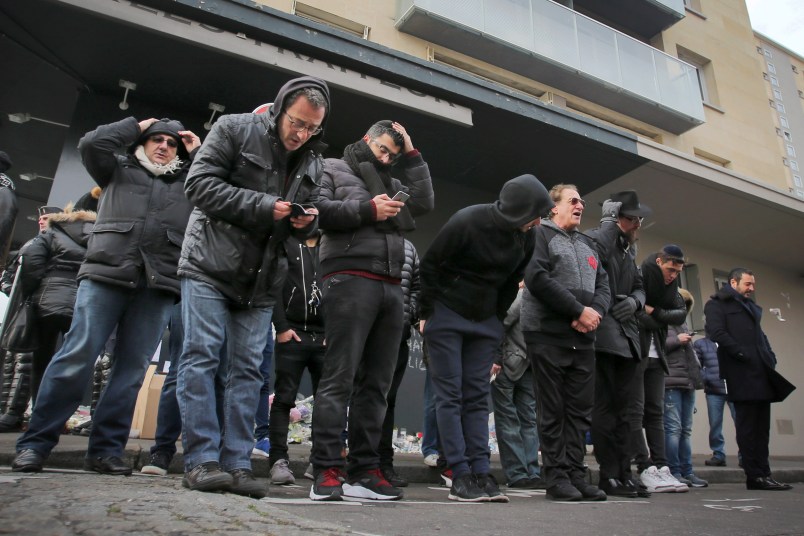I had a lot of responses to my post on Friday about whether French Jewry has a future, many of them highly spirited. One point that isn’t widely appreciated in the US is that France’s Jewish population is not only – actually not primarily – the descendants of France’s historic Jewish population, those who survived the Nazi occupation of France during World War II. A majority of Jews in France are post-World War II immigrants from North Africa (and their descendants), specifically France’s former North African empire. So, it’s some level of irony, that people on both sides of this crisis – French Jews and French Muslims of North African descent – are both in the country in a significant degree as part of the aftermath of the collapse of the French Empire in North Africa. In any case, among the many responses was this email from TPM Reader ES, a longtime reader and frequent correspondent of mine. For a bit of context, in the email ES identifies himself as a French Jew. I believe he is at least a longterm resident of the US and possibly a US citizen …
Ok here it goes.
Note that I’m speaking both as a French Jew and as a historian (however failed!)
First, the Jewish community in France is really two communities. Ashkenazi, with deep roots in France and from various Central European descent. Ashkenazi Jews in France are over-represented in the intellectual, professional and managerial classes in France. Great authors, leading scientists (think Benoit Mandelbrot, Alexandre Grothiendick, George Charpak), bankers, capitalists and even politicians (as far I remember Sarkozy’s mother was Jewish, Laurent Fabius, Dominique Strauss-Khan, Robert Badinter and even the former head of the leading right wing party and Sarkozy’s acolyte, Jean François Copé). The French elites count many many Jews in them, most of them descendants of people from the shtetl.
The other side of French Jewry is from North Africa. They left in the wake of decolonization’s earthquake. Note that they were granted full French citizenship by the Cremieux decree in the 1870s, while their Muslim neighbors, friends and sometimes cousins were not. In the French empire, a divide and conquer policy was implemented. These populations arrived in metropolitan France in the early 60s, and were essentially refugees. Despite their French citizenship they were considered a step above immigrant Arab workers, but honestly that wasn’t a lot. They went on to thrive, relying mostly on the inward dynamism and knack for survival of their community, all without much help from the institutions of the Republic. They own very large companies in fashion, entertainment and technology. The Jewish pieds-noirs, as they are called in a racist reference to their supposed lack of shoes and overall backwardness, are one of the most economically advanced part of French society.
Yet, the alienation and racism they felt upon their arrival and throughout their difficult integration into French society, made them a somewhat insular and revanchist group. They are the ones who really brought back strict religious observance of the Lubavitcher kind. French Ashkenazi always looked down upon these communal expressions as atavistic and somewhat out of place in the context of the French republican values they had wholly espoused.
So given these facts, and to answer your speculative question: I really don’t see how French Jews disentangle themselves from France so quickly. France’s culture, politics and business are as Jewish as they come. These people do not make a big deal in public of being Jewish. They are assimilated and proud of it.
Interestingly the big question is with the Sephardic community – who are still reeling from the aftershocks of France’s chaotic decolonization process, much like the other French populations of North African descent. A recent book by a Sephardic journalist, Eric Zemmour, is the biggest best-seller of the fall. The author claims that Islam is invading France, and that France has been mortally weakened by the left-wing of Charlie Hebdo type, feminists and gay people. Zemmour went as far as saying that all the Muslims should be sent back by boat. He usually peppers his provocations by using himself as a counter-exemple: we (North African Jews) came on a boat, we had nothing, and we worked hard and did not complain and look at us now. Zemmour is not ready to make alyah just yet, in fact he probably will never do that – but a lot of the purported French exodus to Israel comes from the ranks of alienated Sephardim who feel that despite their economic and social achievements, they cannot live as visible Jews in France. Because of clashes with some excited Muslims, but also because they believe rightly or wrongly that France is too soft and accommodating with its Muslim population while it never showed such care or compassion towards them. This distorted view of reality is certainly informed by the painful and recent historical experience of these people. The thinking is: the Arabs kicked us out from Algiers and now they want to kick us out from France, both time with the help and consent of the French government. I’m reducing and schematizing in purpose, but that is the gist of it. It is also my personal experience, having grown up among a small portion of these people.
So they are ripe for the picking by the Jewish Agency. And that is my last point. I have had the opportunity to deal with the Agency in the past few months, in order help my dad move back (he is old and wants to be close to my sister and her kids). He is French, but born in Israel. It turns out a recent Israeli law was passed that exempts from taxes on foreign income immigrants and returning Israelis for ten years. Upon discussion with Agency people, it turns out that residency requirements are barely enforced. This comes from on high: there is a very strong political mandate to boost alyah numbers, for obvious reasons. You can achieve expedited Israeli residency and tax-heaven status for a pittance. The financial aspect of this is a major selling point for the French Jewish community, which can still run their businesses in France but without having to pay anything. The 10-year tax holiday is the best deal around, period. And rich people from all over, with even the remotest ties to Israel, are beginning to take notice.
So that is an important aspect of things. Combine these financial incentives with the light loyalty of part of the French Jews, who have experienced first-hand that the values of the Republic are really for white people, and you get a fuller sense of the situation.
I would finish by saying that their historical experience of racism and alienation, and their subsequent regrouping around the values and beliefs of their tribe, well it’s eerily similar to the historical experience of the lost children of France who committed this week’s atrocities. The difference was that Sephardic Jews from North Africa were more French, at least by law and for much longer, than the other immigrants. As a result, since they had been citizens during the colonial period, they could build more effective demands for actual integration. They were the petits-blancs of France’s North Africa. They still are very much that, given how close they are in culture and history to the other French citizens of North African descents. As I used to say when cops would arrest me on account of my North African looks and Arabic name – hey, I’m Jewish, I’m not an Arab.







